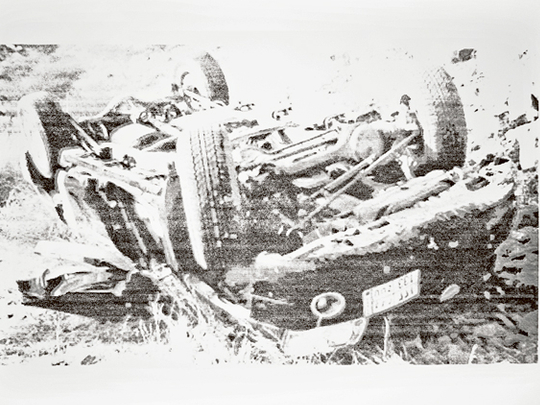
Saudi artist Manal Al Dowayan’s latest exhibition, “Crash”, is based on her research on the alarming number of car accidents in Saudi Arabia in which female teachers are injured or killed. These accidents are regularly reported in Saudi newspapers, but as per tradition the identities of the women are never revealed. Through her work, the artist aims to humanise these accidents and draw attention to the nameless, faceless women, whose tragic deaths have been reduced to mere statistics. The artworks on display include media clippings, research notes, silk-screen prints and videos that go beyond the cold, impersonal crash reports to provide insights into the lives of these women and provoke dialogue on the traditional and future position of women in Saudi Arabian society.
“These women are poorly paid, banned from driving and assigned to teach in remote areas far away from their homes. This forces them to pool funds and travel in groups. But the long distances, unsafe roads and the bad drivers they have to rely on become the cause of many accidents. In the newspaper reports of these accidents, there is no trace of the identity of the victims. People cannot mourn for victims who have no face or name, so this repeated reportage of anonymous crash victims just makes them numb towards the situation. I want to change the way society reacts to this grave situation by presenting the human stories behind the crashes,” Al Dowayan says.
She is exhibiting newspaper clippings about various crashes, along with her notes giving details of the crashes and maps on which she has marked with pins the location of the teachers’ homes, the schools to which they were assigned and the crash sites. These simple notes and maps offer a humane and personal account of the crashes by highlighting the long distances the women had to travel and the risks they were forced to take.
Al Dowayan then moves from this overwhelming clutter of data to an utter absence of recognisable form in a series of silk-screen prints of the newspaper clippings. These look like abstract artworks, reflecting the abstract nature of the public perception of these tragic deaths, and compelling viewers to think about the specific issues involved in the vague media reports.
The artist makes the emotional impact of these tragedies tangible by displaying tweets sent by the women prior to the accidents, and a set of moving, haunting videos with narrations in first person of the stories of the victims. The videos show the victims as young women with hopes and aspirations, who speak about their problems and simple joys, and describe the mundane events of their day up to the moment of the crashes that ended their lives.
Jyoti Kalsi is an arts enthusiast based in Dubai.
“Crash” will run at Cuadro Gallery, DIFC, until April 6.


